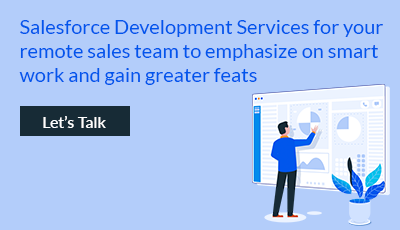
A Guide To The Salesforce Ecosystem In The Fintech Services Industry
- December 12, 2022
- 12 minutes
- 1149
The Fintech landscape is undergoing significant changes at this very moment due to its effect on all aspects of banking, payments and money. However, it can be challenging to navigate such an industry and even more challenging to find devoted customers. A rising number of organizations worldwide in the Fintech area are utilizing Salesforce as their core framework to give exceptional customer ventures.
Moving their technology stack into the Salesforce ecosystem has become increasingly beneficial for financial institutions as Salesforce expands into more industry-specific offerings. Now that we know that the introduction of Salesforce for finance has brought about tremendous changes in the Fintech industry let us know the various impacts of the Salesforce Ecosystem on the Fintech Services Industry.
What Is Salesforce Financial Services Cloud?
Financial Service Solutions from Salesforce CRM enable your bank or financial institution to create personalized customer experiences that foster customer loyalty and trust. Financial advisor software and a lot more are included in Salesforce Financial Services Cloud to provide integrated Service, Sales, and Marketing solutions that break down data silos. Additionally, it is developing more individualized and cohesive customer experiences across all departments and communication channels.
Salesforce Monetary Administrations Cloud is the stage that fills in as the all-in-one resource for your Monetary Help group. It lets you see unique customer journeys and gain meaningful insight into every stage of the customer lifecycle, all in real-time. Salesforce Financial Services Cloud can assist your Financial Services Enterprise to overcome any obstacle, regardless of the industry in which it operates.
Also Read: How Can Salesforce Help In The Seamless Growth Of The Fintech Industry?
What Are The Benefits Of Salesforce Financial Services Cloud?
Salesforce Financial Services Cloud offers many of the same advantages as CRMs. In terms of record keeping, financial institutions perform many of the same back-office tasks as other industries. This list’s first few benefits apply to all industries and salesforce CRM consultant. However, the final two are exclusive to the financial services sector.
1. Experience for Users
Salesforce outperforms all of its rivals in terms of the technology they offer in its products. They lead all CRM platforms on the market in terms of thought leadership.
2. Integrations
Beyond the core Salesforce offerings, there are numerous products that financial institutions can use to their advantage. Einstein, automated marketing tools, Experience Cloud, and other tools for financial industry services are a few examples.
3. Sources for the Salesforce Community
There is a huge Salesforce community. Numerous sources of knowledge, talent, and other resources can be accessed online, over the phone, or in person. Salesforce’s expansion coincides with the community’s continued growth.
4. Experience with Customers
Customers have direct access to tools like never before and can do more for themselves. Automating loan processing and origination is possible. Financial Services Cloud is easy to use, runs smoothly, and keeps your company’s brand consistent.
5. Management of Risk
Salesforce Monetary Assistance Cloud assists monetary firms with overseeing risk better by giving better security and information to the board.
What Is The Impact Of Salesforce On The Fintech Services Industry?
1. A Customer-Centric Company Model
Fintech companies have emerged as major competitors to traditional banks and other large organizations due to their customer-centric company models. The core subject of this disturbance was the client and their sub-optimal involvement in the current, more often than old or slow, administrations of the conventional establishments.
On their path to disruption and success, Fintech businesses gain a valuable partner in Salesforce. Fintech businesses can better understand their customers throughout their entire journey, from potential customers to brand ambassadors, by utilizing intelligent marketing sales tools, tools designed to provide a better customer experience and customer service solutions.
Salesforce gives businesses the tools they need to identify the specific needs of their customers so they can offer them financial solutions when they need them the most. Salesforce for fintech industry will likely attract more devoted customers by establishing a 360-degree customer-centric strategy.
2. Improved Customer Engagement
It is a significant challenge to attract high-quality prospects and keep them as customers. The hardworking Fintech marketers who compete for this attention amid an increasing number of new businesses face this challenge. Salesforce is used by ambitious Fintech businesses to make use of marketing segmentation and automation to deliver the appropriate message to the appropriate customers at the appropriate time.
Salesforce equips Fintech businesses to increase efficiency and productivity when closing new customers and providing high-quality service to them faster than their rivals to win and keep customers. With the 360-customer platform, Fintech firms can supercharge their strategic policies, whether it be giving the right monetary items, answering client questions or dealing with a client onboarding process that is simple, fast and generally ongoing speaking.
3. Increased Sales And Lead Conversions
Salesforce helps financial services and fintech businesses grow more quickly by focusing on the customer’s needs. Sales representatives can focus on closing the right customers or following up with qualified leads to drive new business with workflows, automation, or lead nurturing programs. Customer service teams can prioritize work based on the most important clients and their urgent needs.
Salesforce becomes the focal point of the collaboration between the various teams and departments. This is very convenient for startups that are growing quickly and for dynamic environments where each customer is crucial to the company’s growth and sustainability. Departments can be streamlined, resulting in a significant increase in profits and a decrease in expenses for Fintech businesses thanks to the availability of cutting-edge technology and improvements to processes and workflows.
Also Read: 3 Challenges The Finance Industry Should Overcome In Salesforce Implementation
4. Streamline Operations and Reduce Risk
In the fintech ecosystem, regulatory rules, compliance, cybersecurity, and many other issues pose challenges for any Rising Stars or ambitious entrepreneurs. Only properly implemented AMLs or KYCs and consistent operational processes can significantly impact a young company’s success and growth rate. Numerous financial services companies, including some insurance companies, the largest banks, and rapidly expanding fintech startups, have relied on Salesforce as their trusted partner.
Salesforce is a reliable and open partner for this highly regulated industry because it has made all compliance documentation and uptime readily accessible on trust.salesforce.com. Data-related issues can be avoided and managed without jeopardizing their security with the help of appropriate tools incorporated into streamlined procedures. Fintech businesses can avoid data breaches, operational risks, and mistakes that can hurt their brand’s reputation this way.
5. One Source of Truth for the Whole Organization
Fintech start-ups and companies, in general, frequently acquire technology without first developing a major solution architecture, which results in the accumulation of significant technical debt. This could be because of the high rate of leadership turnover or the business’s shifting focus.
These strategies frequently result in data silos and a scary lack of visibility into business operations, which in turn causes integration and maintenance difficulties, delays, and ultimately dissatisfied customers. Salesforce is an urgent instrument broadly utilized through the Fintech people group and is worked to scale and support development, empowering associations with any Programming interface-empowered arrangement.
It also has a large network of Appstore partners that can be quickly integrated into your Salesforce environment and is quick to set up for new business functions. Salesforce will allow you to remain at the forefront of innovation and adopt a customer-first approach as your business adapts.
What Does The Financial Services Industry Need To Consider About The Salesforce Ecosystem?
The Salesforce Ecosystem’s Relevance to the Financial Services Sector CRMs is not new to the financial services sector. You may, as of now, be utilizing a portion of the Salesforce contributions, like Promoting Cloud, Deals Cloud, and Pardot, to give some examples. Their system may be part of your tech stack’s larger applications. Consider these factors when integrating Salesforce Financial Cloud:
1. Know How The Technology Fits Into Your Existing Infrastructure
You don’t have to be an IT administrator to know how the technology fits. However, you probably need someone on staff who can manage these complexities because many integrations necessitate coding expertise. As a result, integrating Salesforce Financial Cloud might necessitate hiring an expert internally or outsourcing the task.
2. Identify Opportunities For Your Customers
By integrating Salesforce Financial Cloud, you improve the user experience for both your staff and your customers. Your customers or clients can use self-service tools in the Salesforce ecosystem to meet their financial needs.
- Who will have access to this data, and how?
- What will they do with it?
- How will users utilize the tools?
These are important questions to discuss with the person who will integrate your technology stack into your current IT infrastructure.
3. Consider Ongoing Ownership Of The System
Understanding what you require in a support model is the final consideration. Your staff should know the finances, but do they understand how to construct a tech stack? Who will keep control of the system? The program offers a variety of roles. How will the staffing be distributed? Who oversees these roles in the Salesforce ecosystem? Will a Salesforce administrator be hired? You must choose whether to outsource to a managed services provider or hire in-house. These are some of the questions you need to consider to help you understand this point.
Conclusion
Most Fintech services industries require Salesforce to transition into the digital transformation age of automating tasks to create more effective workflow processes. Thanks to the salesforce fintech solution, firms can now improve customer service, control risk, and advance into the future of financial services. Many will require a managed service provider to incorporate Salesforce into their technology stack.
The use of Salesforce CRM with the proper consultant services can help enhance the possibilities of a fintech company manifold. GetOnCRM Solutions is a Salesforce silver consulting partner that can help Salesforce CRM integration for fintech companies for various financial processes and automated operations.







